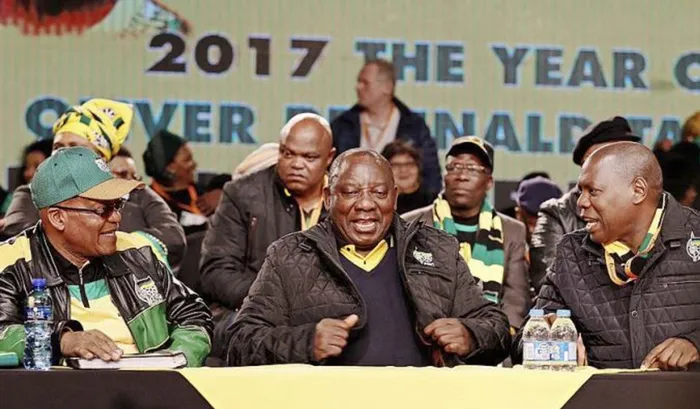ANC Policy Paralysis under Scrutiny

Picture: Simphiwe Mbokazi/African News Agency (ANA) – Jacob Zuma, Cyril Ramaphosa and Zweli Mkhize at the ANC’s 2017 Nasrec elective conference held in Johannesburg. The party has been unable to implement some of the policy resolutions taken at that conference. With these and many other challenges, the ANC’s policy conference will test the leadership qualities of the party leaders and delegates, says the writer.
By Bheki Mngomezulu
As a norm, people become leaders under different circumstances. There are those who become leaders because they genuinely deserve those positions. Others become leaders by chance.
This is occasioned by the fact that they happen to be at the right place at the right time. In Kenya, Daniel arap Moi was elected to replace then-president Jomo Kenyatta as the leader of the Kenya African National Union because, as a Kalenjin, he was assumed to be a neutral person compared to the Kikuyu and the Luo, who were known political rivals.
In Angola, José Eduardo dos Santos was elected as MPLA leader to succeed Agostinho Neto for the same reasons. The latter succumbed to pancreatic cancer in 1979. Dos Santos, who assumed power used to refer to himself as “an accidental president”.
He had no ambition to become a leader but happened to be in the right place at the right time. Some leaders pave their way into leadership positions through dubious means – which include killing their potential contenders. For these reasons, we can safely say that anyone can occupy a leadership position. However, not everyone possesses leadership skills to be able to lead properly. True leaders emerge in times of crisis, not when everything is running smoothly. A leader succeeds or fails depending on how he ascended to the position and whether he is capacitated once in office.
This broader context is relevant in explaining the situation in which the ANC finds itself. The party is currently facing a number of challenges. One of them is to find visionary leaders who will put the country and the party before their personal interests. The other challenge is to find leaders who will guide the organisation through these turbulent moments.
July has been identified as the month during which the ANC will hold its policy conference in preparation for its December elective conference. In the past, this conference has been held in June. Therefore, this year marks a deviation from the custom. But the date is not the main issue. The concern is that this conference is held at a time when the ANC has too many challenges with which to wrestle.
One of these challenges is the evident lack of unity in the party – commonly referred to as factionalism. As a result of this situation, the ANC’s time and resources are diverted towards satisfying personal interests, not the interests of the party and the country. The second challenge is that the ANC has been unable to implement some of the policy resolutions taken at its last elective conference that was held in Nasrec in December 2017.
For example, to this day, land is still in the hands of a few. Moreover, instead of the lives of the people improving, the situation has deteriorated. Crime levels are high, the economy is weak, petrol prices keep on increasing while salaries remain the same, intermittent electricity cuts make any business venture impractical.
The list goes on. With these and many other challenges, the ANC’s policy conference will test the leadership qualities of the party leaders and delegates. First, it will be of utmost importance for the delegates at this conference to be honest when deliberating policy issues. Second, they will have to demonstrate vision and foresight. Third, they will have to separate policies from personalities and put the country and the party first.
While these challenges are real, postponing the conference is not an option for three reasons. First, any prolonged postponement would be in contravention of the party’s constitution. Second, delays would negatively affect the elective conference later in the year. Third, postponing the conference would not make the challenges disappear. It is important that the conference continues. It will demonstrate how serious the ANC is in tackling the challenges it faces.
It will enable everyone to assess the extent to which the party is being honest with itself and the country. The outcome of the conference will give the electorate a sense of what to expect from the ANC in the 2024 general election and make informed decisions. To the ANC, the conference is very important. It will afford the party an opportunity to identify the policies that are implementable and fruitful.
It will also present an opportunity for the party to identify policies that need to be amended, as well as those that should be totally discarded. It is an irrefutable fact that the ANC will go into its policy conference divided to the core.
The cloud hanging over its president, Cyril Rampahosa, on the Phala Phala matter has made the situation worse. Should the ANC come out of the conference showing no signs of unity, that would be an indictment on its leadership.
Mngomezulu is a Professor of Political Science and Deputy Dean of Research at the University of the Western Cape.
Related Topics: